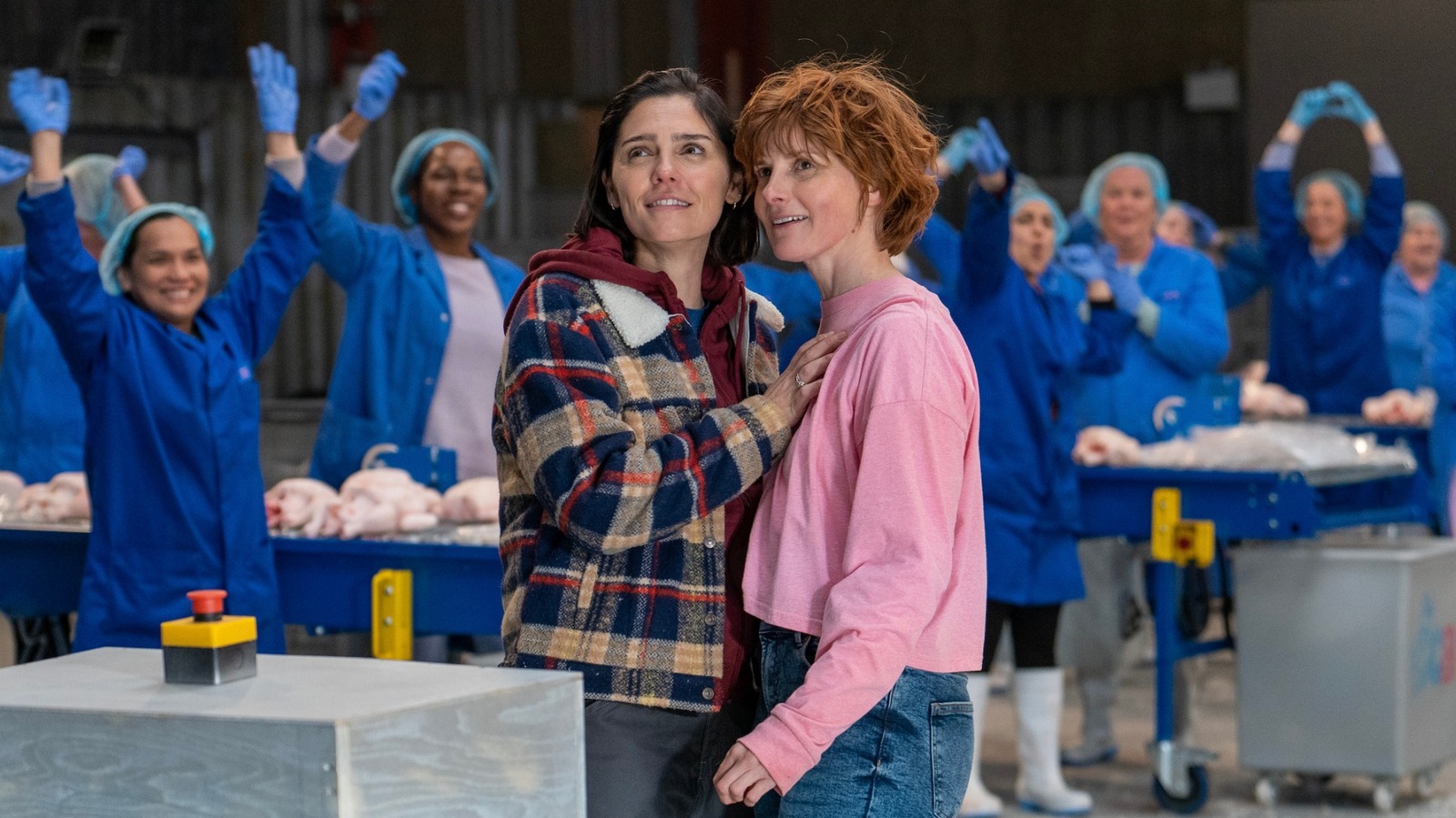
Chuck Chuck Baby Review: A Tender Romance Anchors This British Tale – /Film
Helen (Louise Brealey) wakes in a bright, all-pink room, but the reality of her life is nothing like the whimsical room she’s awoken in. She lives with her ex-husband Gary (Celyn Jones) and his girlfriend Amy (Emily Fairn in a hilarious performance evoking “Little Britain”). She’s not moved out as she has a strong connection to Gary’s mother Gwen (Sorcha Cusack), who she cares for when not working night shifts at the local chicken plant. Leaving is all too tempting — in the opening scene, she takes a suitcase out from under her bed but doesn’t go through with packing. Her friends at the plant, Lynn (Emily Aston), Clare (Cat Simmons), and Paula (Beverly Rudd) try and get her to open up, but she seems resigned to the predictable monotony of her life in a small Welsh town.
That all changes when Joanne (Annabel Scholey) re-appears in their quiet town after years away. Joanne went to high school with Helen, and the pair harbored romantic feelings for one another that they were far too afraid to speak out loud — they never even spoke to each other at school. But now, both Joanne and Helen, who’ve struggled to live their lives the way they want, have an incredible, and incredibly frightening, opportunity to explore those feelings that have lain dormant for decades. “Chuck Chuck Baby,” having its world premiere at the Edinburgh International Film Festival, written and directed by Janis Pugh, dresses up a fairly standard British mode of filmmaking with a queer love story, and distinct musical elements.
Those musical elements of “Chuck Chuck Baby,” however, feel quite undercooked, and the film can’t seem to figure out whether it’s a musical or not. It sort of awkwardly teeters between the two worlds, not fully committing to either. At times, the musical moments work — Helen singing and crying her heart out in her car at the beginning of the film is a moment of beauty. Another musical moment comes at the expense of a perfectly charming pub scene, which is undercut by a sudden, unnecessary shift to song. Instead of the moment giving us further insight into the characters, it has the opposite effect, taking us away from spending time with these women in favor of a quick musical flourish that feels more empty than enlightening. “Chuck Chuck Baby” could have benefitted from really figuring out the musical elements — it never feels like any of these women need to express themselves through song, which is an essential part of any great musical number.
There’s a common narrative technique in storytelling to show, not tell, but “Chuck Chuck Baby” prefers to both show and tell. That all too often dampens the impact of the story it’s telling. The songs sung feel far too on the nose, but the issue extends deeper than the musical elements. When Joanne and Helen share a touching moment on the literally titled Lover’s Lane, the camera pans to reveal the street sign reading “Lover’s Lane.” That could be sweet, but the film has made it very clear they’re already on Lover’s Lane, and pushing it over the top by showing and telling turns a poignant moment into a cloying one — this wink-wink nudge-nudge recurs throughout the film, which would be better off without them. It almost feels as if the film doesn’t trust its audience to understand what’s already been told to us. It’s curious too, that a film that’s so keen to show and tell seems to shy away from moments of physical intimacy between Joanne and Helen.
A striking queer romance buried in a predictable plot
 BFI
BFI
Despite some undercooked themes and the odd over-explanation, “Chuck Chuck Baby” beautifully explores what it means to be queer in a small town. “I can’t breathe here,” Joanne tells Helen in a revealing moment. It’s a beautifully written line that speaks deeply to the issues queer people face growing up, and how homophobia lingers long and stews in the mind for days, months, and even years after the words have been said. Returning to her hometown is incredibly difficult for Joanne, whose upbringing never allowed her to embrace who she was, hiding away her true feelings for Helen. Only 20 years later is Joanne finally able to tell Helen her feelings, having been able to open up about her sexuality away from her hometown trappings. The impact of small-town homophobia has clearly impacted Helen too, who’s lived a life that’s not amounted to a whole lot, as she’s felt more comfortable in the shadows; you cannot hurt what you cannot see, which seems to be the mantra she’s unwittingly saddled herself with.
Watching Helen embrace her true feelings and slowly but surely make her way into herself is where “Chuck Chuck Baby” is best. Louise Brealey gives a fabulous performance, refusing to succumb to showy displays, instead preferring a gradual revolution that feels grounded and believable. Her chemistry with Annabel Scholey is potent, and their burgeoning relationship is lovely — these characters have waited decades for this relationship to become a reality, and you can feel the excitement, and the trepidation, in each moment.
This is ultimately a film about the warmth and power of female relationships. Whether between Gwen and Helen, Helen and her co-workers, or the romance of Helen and Joanne, these connections are warm and cuddly, particularly in contrast to the icy relationship between Helen and her ex Gary. The way these women support and uplift each other, whether through a tender, knowing glance, or a screaming outburst, is cleverly captured.
Though “Chuck Chuck Baby” treads familiar plot beats and offers little surprise, it’s something of a feat to turn such familiar British film territory into something prominently LGBT+. Its innate understanding of queerness and female bonds allows the lesbian relationship to never feel like window dressing. It’s a film about how we don’t have to accept the cards dealt to us; it’s never too late to want more from life, and from living.
/Film Rating: 6 out of 10




































